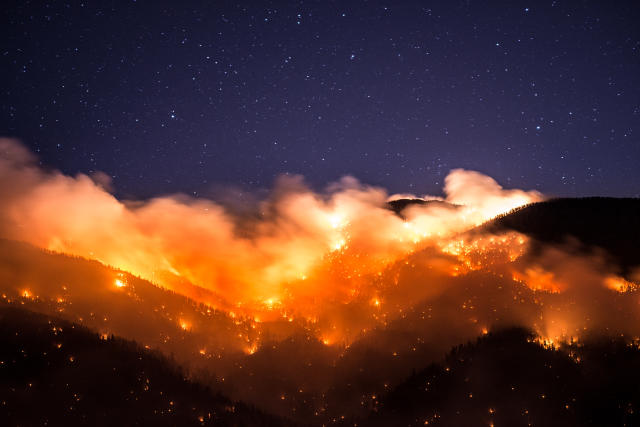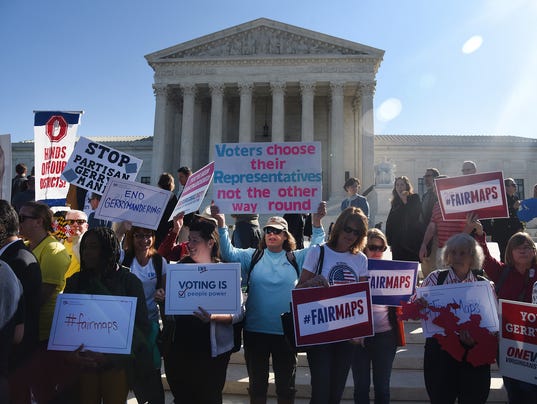ThinkProgress
Northern California firestorm ‘literally exploded,’ killing 15 and destroying hundreds of homes
More than 200 have been reported missing after fast-moving fires devastate communities north of San Francisco.
Natasha Geiling October 10, 2017
 Flames from a massive wildfire burn in Napa, CA. (CREDIT: AP Photo/Rich Pedroncelli)
Flames from a massive wildfire burn in Napa, CA. (CREDIT: AP Photo/Rich Pedroncelli)
High temperatures and fast winds are fueling more than a dozen wildfires across California, forcing more than 20,000 northern California residents to evacuate their homes and communities. At least 15 people have died, and more than 200 have been reported missing, after several fires spread rapidly throughout Monday.
The fires ignited late Sunday night and into Monday morning and have since spread over 50,000 acres across Napa and Sonoma counties, destroying at least 2,000 structures and sending at least 100 to the hospital with injuries ranging from burns to smoke inhalation. The Tubbs Fire — which is currently burning at 27,000 acres — has prompted the evacuation of at least 10 neighborhoods in the city of Santa Rosa, which has a population of 125,000. Two hospitals have also been evacuated after the fire jumped across Highway 101 between Sunday night and Monday morning.
Aerial photographs show entire neighborhoods of the city completely destroyed by the fire, which as of Tuesday morning was zero percent contained. Smoke from the wildfires caused the Bay Area Air Quality Management District to issue an air quality warning for the region on Monday; as of Tuesday, much of the area north of San Francisco was still experiencing unhealthy air quality.
The cause of the fires is still under investigation, but officials are confident windy conditions combined with an excess of dry grass and underbrush helped the fuel the fires’ rapid growth. According to the National Weather Service, “fire literally exploded and raced along the landscape” aided by fuel at “all time record dry levels.”
September and October tend to be the worst months for California’s fire season, as strong winds can combine with low humidity and dry vegetation to turn a single spark into a major incident. At the beginning of September, fast-moving winds and record-heat sparked the largest wildfire in Los Angeles’ history, burning more than 5,000 acres north of the city. The worst wildfire in California history — the Cedar Fire of 2003 — started in October and burned more than 273,246 acres, destroying 2,820 structures and killing 15. Already, the scope of this weekends’ fires rivals the destruction of the Cedar Fire.
Fast-moving winds and low humidity aren’t rare in California, and neither are October wildfires, but it’s likely climate change made these fires even more destructive. After years of historic, prolonged drought, which studies have linked to climate change, California experienced record-setting rains that fueled the growth of grasses and underbrush — young vegetation that dries easily during the summer and is especially susceptible to ignition. Because warmer atmospheric temperatures can hold more water, experts have suggested that the cycle of drought followed by intense precipitation could be linked to climate change.
Even the state’s characteristic winds — known in the northern part of the state as Diablo Winds and in the southern part of the state as Santa Ana winds — could be getting worse because of climate change. The Santa Ana and Diablo winds occur when high inland pressure pushes air down the sides of mountains (Mt. Diablo in northern California and Mt. Ana in southern California), whipping wind through the canyons and hillsides outside major population centers like Los Angeles and San Francisco. According to a 2015 study lead by researchers at University of California, Los Angles, UC Davis, UC Irvine, and the U.S. Forest Service, a warming climate will likely make these winds both more frequent and stronger, fueling potentially destructive fires.
Across the country, warm, dry conditions have fueled a record-breaking fire season. The National Wildfire Coordinating Group currently lists 179 active wildfire situations throughout much of the Western United States, from Colorado to Washington. The largest active fire in the United States is the Chetco Bar Fire in southern Oregon, which has burned over 191,121 acres and is 97 percent contained. As of October 6, wildfires have burned 8,469,590 acres across the United States — the third largest total acreage burned in the last 10 fire seasons.
According to an analysis by Climate Central, climate change has increased the length of the annual fire season, a reference to the time of year when conditions are ripe for wildfires, by 105 days since 1970. Over the same period of time, the average number of wildfires over 1,000 acres has doubled across the western U.S. Since 2000, at least 13 states have experienced their largest fires on record.
As climate change is fueling longer fire seasons, human activity — both through an intense focus on fire suppression, rather than forest management, and an decreasingly populated rural-urban boundary, are making fires more destructive and deadly. A longer and more active fire season is also stretching the bounds of the Forest Service’s budget, with 2017 fire suppression costs already exceeding $2 billion, making this the most expensive year on record.
Unlike disasters like hurricanes or earthquakes, wildfires don’t qualify for federal disaster funding under the Disaster Relief Act; instead, the Forest Service is forced to pay for fire suppression costs in excess of the budgeted amount by borrowing from other Forest Service programs. That means in especially active fire years, the Forest Service is taking money from programs meant to prevent fires and using those funds to fight existing fires — a cycle that critics of the current set-up argue puts the Forest Service at a perpetual disadvantage when it comes to anticipating and preventing forest fires.
“Land managers can’t plan for restoration projects, even if they have huge fire benefits, if they don’t know whether the money is going to be there by the time they get around to doing the project,” Collin O’Mara, president and CEO of the National Wildlife Federation, told ThinkProgress. “An account for a forest in Tennessee could be slashed to fight fires in Wyoming, and then all of the sudden you could have a terrible fire in Tennessee the next year, and you didn’t get the project done, so it ends up burning bigger, brighter, and longer than it would have if you had the projects completed.”
Driven by heat and high winds, wildfires are 10 times worse this year than average.
Climate change means that there is no such thing as a typical “fire season” anymore.
Since 2015, the Forest Service has spent more than 50 percent of its budget on fighting wildfires — more than a thirty percent increase from 1995, when fire suppression was just 16 percent of the agency’s budget. According to a 2015 report, future fires could consume even more of the Forest Service’s budget, to the point where by 2025, two-thirds of the agency’s budget could be spent on fire programs.
One legislative solution for the Forest Service’s budget woes currently being considered in Congress would allow the agency to draw from a separate pool of federal disaster funds, similar to what other agencies can do through FEMA after a disaster like a tornado or hurricane. That bill, known as the Wildfire Disaster Funding Act of 2017, is sponsored by a bipartisan coalition of nine Western senators — five Democrats and four Republicans. In the House, Rep. Mike Simpson (R-ID), has introduced a similar bill for the past three years. Speaker of the House Paul Ryan (R-WI) has urged Republicans in Congress to oppose the bill in the past, arguing that it would “result in increased federal spending.”
Fiscal conservatives in Congress have instead proposed a different way to address the rising costs of forest fires: loosen environmental regulations to allow timber companies more leeway to thin forests, thereby lessening the amount of fuel available for wildfires. One bill, introduced this year by Rep. Bruce Westerman (R-AR), would do away with the public input and full environmental review process for thinning or logging projects of 10,000 acres or less (currently, only projects 3,000 acres or less are subject to less stringent environmental regulations). It would also allow the Forest Service to forgo required consultations with the Fish and Wildlife Service if the agency determined the project was unlikely to harm a federally protected species.
Westerman, who has received more than $142,000 from the timber industry since being elected to Congress in 2014, has argued that the bill would “provide protection to America’s forests by reducing the risks of wildfires through proper management techniques.” Westerman received a master’s degree in forestry from Yale Forestry School in 2001, and is the only licensed forester in Congress.
But environmentalists, conservationists, and Democratic lawmakers argue that the real problem with the growing cost of forest fires isn’t a lack of management techniques, but a lack of funds with which to implement them. Even Secretary of Agriculture Sonny Perdue has criticized the current funding structure of the Forest Service, saying in September that without a consistent stream of funding, “we’re asking for disasters.”
“You can have all the tools in the universe, but if you don’t have the resources to implement that, it doesn’t matter,” the National Wildlife Federation’s O’Mara said. “And that’s where we are right now.”
Update, 10/10/17, 4:29 p.m. EST: This story has been updated to reflect new estimates of the number of missing persons, fatalities, and destroyed structures.

 Lake Fire | Big Bear June 2015
Lake Fire | Big Bear June 2015 Source: Landsat 8
Source: Landsat 8 Rain causes nutrients from fertilizers on farmland to run off into rivers.
Rain causes nutrients from fertilizers on farmland to run off into rivers. The nutrients travel along rivers, eventually reaching Lake Erie.
The nutrients travel along rivers, eventually reaching Lake Erie. Source: Aerial Associates Photography, Inc., Zachary Haslick
Source: Aerial Associates Photography, Inc., Zachary Haslick Source: NASA MODIS Note: Only intake points for towns and cities in Ohio are shown.
Source: NASA MODIS Note: Only intake points for towns and cities in Ohio are shown. In this Sept. 20, 2017 photo, a catfish appears on the shoreline in the algae-filled waters at the end of 113th Street in the Point Place section of North Toledo, Ohio. The 2017 algae bloom has stretched along the shores of Ohio, Michigan and Ontario, Canada, and will be among the largest in recent years. The 2015 bloom was the largest on record, covering an area the size of New York City. (Andy Morrison/The Blade via AP) (Associated Press)
In this Sept. 20, 2017 photo, a catfish appears on the shoreline in the algae-filled waters at the end of 113th Street in the Point Place section of North Toledo, Ohio. The 2017 algae bloom has stretched along the shores of Ohio, Michigan and Ontario, Canada, and will be among the largest in recent years. The 2015 bloom was the largest on record, covering an area the size of New York City. (Andy Morrison/The Blade via AP) (Associated Press) (Photo: Olivier Douliery, Getty Images)
(Photo: Olivier Douliery, Getty Images) Buy Photo
Buy Photo This simple pulley system allows the process to repeat indefinitely. Photo Credit: GravityLight
This simple pulley system allows the process to repeat indefinitely. Photo Credit: GravityLight Interior Secretary Ryan Zinke talks with rancher Heidi Redd at the Bears Ears National Monument in Utah in May. (Scott G. Winterton/Salt Lake City Deseret News via AP)
Interior Secretary Ryan Zinke talks with rancher Heidi Redd at the Bears Ears National Monument in Utah in May. (Scott G. Winterton/Salt Lake City Deseret News via AP) Surrounded by miners from Rosebud Mining, President Trump signs his executive order on energy independence at the Environmental Protection Agency’s headquarters in Washington in March. (Jim Watson/AFP/Getty Images)
Surrounded by miners from Rosebud Mining, President Trump signs his executive order on energy independence at the Environmental Protection Agency’s headquarters in Washington in March. (Jim Watson/AFP/Getty Images) A gas flare burns as a driver monitors a water tank near Sidney, Mont., in February 2015. (Daniel Acker/Bloomberg News)
A gas flare burns as a driver monitors a water tank near Sidney, Mont., in February 2015. (Daniel Acker/Bloomberg News)